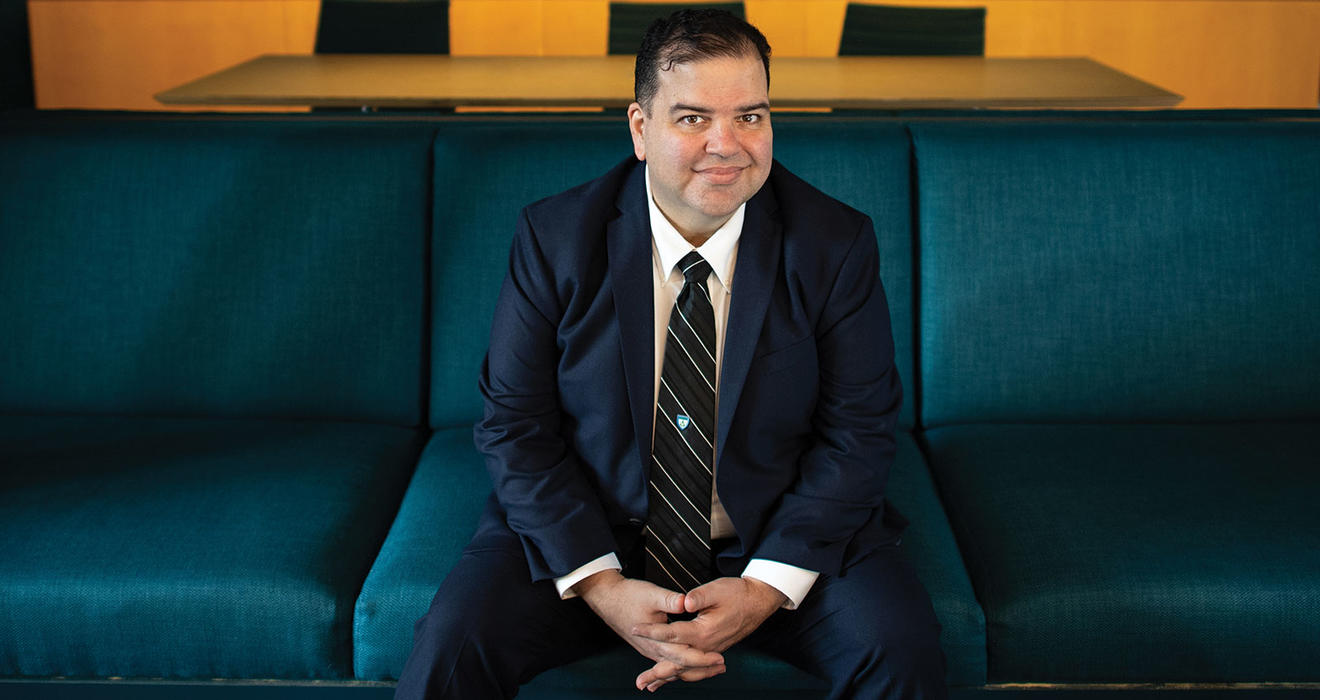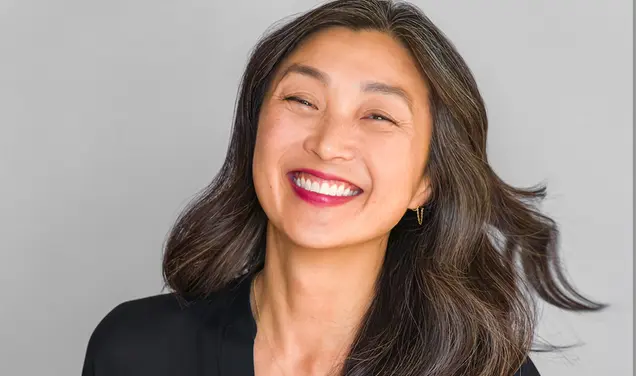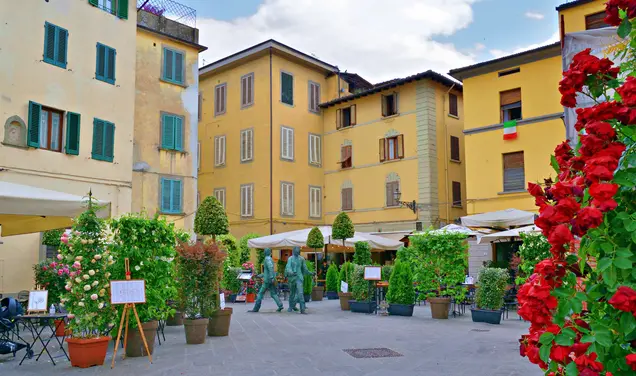
IN A BASEMENT CLASSROOM of the Julis Romo Rabinowitz building on Washington Road one autumn afternoon, assistant professor of sociology Janet Vertesi looks out at the 20 or so students in SOC 346, Sociology of the Cubicle: Work, Technology and Organization, and asks, “Do most of you identify as millennials?” In the spirited conversation that follows, it’s decided that “the cut-off” birth year is 1997 — which means most of today’s college students are “whatever comes after the millennials.”
Throughout the exchange, one member of the Class of 2019 stays quiet. Sitting in the front row because his hearing aids work better up there, and wearing a black suit and a silver tie because a classroom deserves the same respect as a workplace, he is usually one of the most vocal people in the room. But today he decides not to mention that 1997 was the year he would have graduated from Princeton the first time around.
José Pabón is here to finish what he started. At the end of 1996, during his senior year, he was forced to withdraw from Princeton. Now he has returned — older and wiser, bringing his wife and toddler with him — to complete his degree and to get his life where he always thought it would be.
In doing so he is a one-man measure of how Princeton itself has changed in the last two decades, and how it has not. He is a test of that thing we say about youth being wasted on the young, and of whether given the chance to do it over again we would really do anything differently. He is a walking time warp, a happy ending, a cautionary tale.
“You know that song?” he asks, starting to hum.
Yes, he gives new meaning to “Going Back to Nassau Hall.”
PABÓN WAS BORN AND RAISED in Puerto Rico. The youngest of four children, he was the only son. Two sisters preceded him to Princeton, but that doesn’t mean he was savvy in the ways of the place when he arrived, he says. Those sisters were more than a decade older, and his only real memory of campus was a graduation when he was all of 8. His father died a few years later, meaning Pabón’s teens were spent living alone with a single mother who was, he says, deeply grieving “and doing the best she could.”
As a result he mostly raised himself, with his mother’s brother, a physician, providing doses of inspiration and his sisters, during visits and phone calls home, giving glimpses of college and beyond. He learned English by watching mainland television almost exclusively, which is also how he learned to root for the Atlanta Braves. He loved math, was president of his school’s math club and computer club, and studied so fiercely for the SATs that he started dreaming about multiple-choice problems. He got a perfect score in math and a near-perfect one in English. His school counselor predicted that MIT would be the only top school to admit him, but it was the only one he applied to that didn’t.
Princeton offered more financial aid than Harvard, which back then meant 80 percent in grants and 20 percent in loans, so in addition to playing in a band on Sundays at the Aquinas Institute, the Catholic chaplaincy just off campus, and tutoring local math students, he washed dishes several nights a week in the Wilcox kitchen because it paid nearly $2 an hour more than serving food.
The time he wasn’t working, he was studying. Social life? What social life?
“I tried to fit in, but I don’t think I did the best job,” Pabón says. He was one of just eight or nine Puerto Ricans in his class, he remembers, and he believes he was the only one of those taking STEM classes. “I was from a low socioeconomic background,” he says of his life back then. “Just grinding it out, trying to learn math on my own and working the dish room at Wilson/Butler dining hall.”
His public school in Puerto Rico had not fully prepared him for how tough the academics would be. “Except for the loss of my father and my uncle, who was like a father, there is nothing I have ever done that has been as hard as Princeton math” freshman year, he says. “Nothing that was as soul-crushingly difficult as the weekly problem sets.”
The result was the first imperfect grades of his life. “This is amazing,” he remembers feeling. “I studied for 20 hours and got a D; maybe 30 hours, I’ll get a C.” He did not feel defeated. Instead, he felt that “the more math I learn, the more I realize there’s so much more I don’t understand yet.”
It didn’t occur to him that he could ask for help. “I thought office hours were to go ask where the printer was, or to change from one precept to another,” he says. “I didn’t realize you could go to a professor and say, ‘I’m lost.’ ”
By sophomore year he was less so, and by junior year he was majoring in math. He didn’t consider joining an eating club because he could not afford the additional cost. So he declared himself independent and lived in Spelman Halls junior and senior year — well, during the first half of senior year, anyway.
He was home in Puerto Rico and preparing to return to campus in August 1996 when he and a friend borrowed Pabón’s uncle’s car, went on a double date, then dropped off the two young women and headed home. On the highway they were rear-ended by a man who had fallen asleep with his foot on the gas. This would become that driver’s fifth DUI.
Both cars were totaled. Pabón, who had an unblemished driving record, was cut out of his car by police and spent several days in the hospital with back and neck injuries. “My mother told me, ‘You need to call your uncle, you need to deal with the insurance companies, you need to deal with the police,’” he remembers. It soon became clear that he would not be able to return to campus for the first week of classes after Labor Day. Classes began, and for more than 20 years Pabón has tried to understand what he did — or more specifically what he didn’t do: Show up.
Pabón has only hazy memories of those weeks — he was in pain and repeatedly asked to give statements to the police and the insurance company. But he didn’t tell anyone — not his suitemates, his professors, his advisers, nor his deans — about what had just happened in his life. And when he finally got back to school three weeks late, he says, no one really asked.
Facing zeroes for the weekly assignments he had not turned in and others for precept absences, he frantically tried to dig his way out. But he knew about numbers, and he knew they were against him. Come midterms, he was failing all his classes, which resulted in a summons to the dean’s office and a warning that he was at risk of flunking out. Again he didn’t mention the car accident, but simply promised, “I’ll do better, I’ll try harder,” he recalls. Then he studied and scrambled, feeling “dejected, depressed, shamed, excluded.”
He had resigned himself to the likelihood that he would fail his four math classes and Sociology 101, and his Plan B was “worse comes to worst, I’ll take more classes the next semester and make it up,” he says. He didn’t understand that isn’t how it works. Instead, he faced what he remembers being described as “forced withdrawal” from the University until he could demonstrate “academic readiness to return to campus.” That’s still what sometimes happens, says Claire Fowler, senior associate dean of the College: Students who fail two or more classes in a single semester are normally required to repeat that semester the following year, and may be encouraged to use the time off to brush up on the subjects that stymied them or to address other issues that may have prevented them from thriving at Princeton. “It’s not punitive,” she says. “The message is that this is to help you be in a better position to be successful the next time around.”
In recent years between 150 and 200 students have taken such a leave of absence, Fowler says — some for academic reasons, some for medical ones, “some to start a startup, or because they are just not up for coming back right now.” Nearly all return within a year or two, she says, hence Princeton’s six-year graduation rate of 96 percent. A few others have stayed away as long as Pabón, she says, but that happens “very infrequently.”
FORCED TO LEAVE IN JANUARY 1997, Pabón didn’t know where to go. He sought shelter at the Aquinas Institute, where he basically hid for a week, maybe two — he’s not sure. His mother finally tracked him down there and sent him a ticket back to Puerto Rico, where his uncle met him at the airport.
Driving to Pabón’s mother’s apartment in a new car, his uncle was encouraging. “I want you to know I failed out of medical school, and nobody wanted to believe in me either,” Pabón recalls his uncle saying, “but I knew I could do it, and I got back up again and got back on track. I know you can do it, too.”
Princeton had given him a path back. To “demonstrate academic readiness,” he was told to take courses at a school near home — one class on complex analysis and another on stochastic processes. He contacted the University of Puerto Rico — a school that had offered him a full scholarship after high school — with the intention of enrolling, but was told these were graduate-level classes and he could not take them without an undergraduate degree. In response, he applied as an undergraduate. He was rejected because of his Princeton grades.
Looking back, he says he should have contacted the University, asked for some guidance, perhaps a different list of courses. But instead he gave up on school and got himself a job. He began at a huge telephone company he prefers not to name, where he was one of the humans who typed the text of messages onto beepers. He was promoted to quality-control manager, where he anonymously tested the transcriptionists with random calls. Eventually he was transferred to the IT department, where he spent the next 20 years.
“It was a natural fit,” he says. “It’s problem-solving, and math taught me to problem-solve, to understand the underlying logic.”
PABÓN SITS AMONG a small group of students around a conference table at the Carl A. Fields Center for Equality and Cultural Understanding at the corner of Olden and Prospect. The building had been Elm Club until shortly before Pabón was admitted to Princeton the first time, and now it houses what was called the Third World Center back then.
There’s a lot of that in his life now — the overlay of what is with what was. The campus looks different — residential colleges have replaced tennis courts and empty fields — and it feels different, too. When he arrived with others in the Class of 1997, nearly 60 percent of undergraduates were male; his current class is essentially at gender parity. There were 66 Hispanic students in his class the first time, 113 the second. Yearly tuition, room, and board back then was almost $25,000, compared with the most recent estimated costs of more than $70,000. Princeton’s “grants, not loans” policy was not in effect when Pabón was first admitted, and he spent five years after he withdrew repaying $15,000 in loans for a degree he didn’t get. This time, he has a full ride on financial aid.
Also new is the group that is gathered at the Fields Center — five members of the Scholars Institute Fellows Program, or SIFP, munching pizza piled with toppings and drinking Diet Coke from mugs that say “Equality Is the Soul of Liberty.” This mentoring group for first-generation and low-income students meets weekly, created to be a safe off-the-record space where members help each other navigate a school that still can be overwhelming to those whose pre-Princeton worlds did not include tutors or math camps or stories of parents’ alma maters. It is part of an increasingly taut web of support for today’s students — overlapping layers of residential-college advisers, peer advisers, health peer advisers, dorm advisers, residential graduate advisers, and a whole variety of deans. Had this network existed when Pabón arrived three weeks into the fall term two decades ago, would his life have been different?
He can’t know what would have happened, only what did. He married a few years after starting work in IT and had his first daughter, Carmen, in 2000; she is now a freshman at the University of Puerto Rico. His first marriage ended in divorce. The Princeton Alumni Weekly kept coming, addressed to José Pabón ’97, because once Princeton gives you a number after your name, he’s learned, you can keep it forever. He flew to Reunions every five years — proposing to his second wife, Yahyra, at what would have been his 15th, kneeling with a ring on Poe Field as the fireworks shimmered overhead. They married in December 2012, a date chosen because the Mayans had predicted it was the day the world would end. Their daughter, Naiana, was born during the summer of 2015. Life was good, he says. He was earning a comfortable living running a telephone-company data center in San Juan. Still, he felt there was a hole in his life where his diploma should be.
In 2016, Princeton President Christopher Eisgruber ’83 came to speak at a gathering of Puerto Rico alumni at the swankiest hotel in town. Near the end of the evening, “I screwed up my courage and went to talk to him,” Pabón says, but others wanted their few minutes with the president, too, and Pabón didn’t get his chance. Margaret Moore Miller ’80, then head of the Office of Alumni Affairs, noticed he hadn’t gotten his say and introduced herself.
This time, he asked for help.
Working with Fowler, the dean responsible for student readmission, the math department helped Pabón to find courses available to him at the University of Puerto Rico, choosing two that would show the required academic readiness. A student strike at that school meant he had to meet with his professors via Skype, stretching what should have been one semester of coursework into just over a year.
Then a literal hurricane roared through. As Maria pounded the island, Pabón and his family huddled in their apartment listening to wind shake the windows, hoping that the roof would hold.
“Everything is broken,” his younger daughter said when they emerged into a changed world. Their apartment building was badly damaged; there was no power or water; food was scarce. After waiting in a line at Kmart for 10 sweltering hours to receive only one case of Vienna sausages, and submitting forms to FEMA only to be told that the money had run out, Pabón decided “we couldn’t keep living like that. We needed to leave.”
His plan had been to re-enroll as a Princeton senior in the fall of 2018, but he asked if he could return in the middle of the year, to start in February. The University agreed.
Twenty years earlier he’d been forced out of Princeton, leaving him feeling he had no place to go. Now, when he had no place to go, Princeton was taking him in.
NAIANA COMES RUNNING to the door wrapped in a towel when she hears her father’s key in the lock. The apartment in graduate housing is tiny, more than filled by the multicolored swirl that signals life with a toddler. Scooping the girl in his arms, Pabón gives a quick tour — the single bedroom he and his wife share with their daughter; the desk in the living room, where he does his homework, a copy of the handbook Rights, Rules, Responsibilities front and center. The kitchen is cramped but serviceable and the cutlery is a mismatch left by previous tenants. The plastic dining set is sized for a nursery school. Naiana loves it, and it has the additional benefits of being a free hand-me-down and fitting in the tightly packed room.
Small though it might be, Pabón is grateful to have the apartment at all. He had looked for a rental nearby, but prices started at about $2,000 a month. This apartment rents for $700, all of it covered by his full-ride scholarship. He will leave without debt this time.
Halfway through fall semester, he describes his adjustment as rocky. Back in the 1990s he didn’t fit in because of his background, he says. This time it is because of his age. While he has made two or three real friends among the undergraduates, he says, “most students assume I’m a professor. They ask my permission on where to sit the first day of class.”
He’s learned to answer, “I don’t look like you, but I’m an undergraduate like you; I’m a very senior senior.”
During midterms he went to a study break and a neuroscience junior asked him to leave. “Sir, are you a member of the University community?” he was asked. When Pabón showed his ID, the student blushed and hurried away.
But he quickly adds that so much is better this second time around. Part of that is because of all the ways that Princeton is different — from the fact that math students may collaborate on those brutal problem sets, to the way reserve readings can be accessed online, to the cornucopia of food choices on campus — Vegetarian! Vegan! Made-to-order omelettes! Smoothies!
And mostly what’s better is all the ways that he has changed.
Yes, he has lost an irreplaceable something between then and now. “With math, the mind peaks young,” he says. “You forget a lot more quickly than you learn, and math to me now is often like a riddle where I have forgotten the punch line.”
On the other hand, he says, “I humbly submit that I am wiser. I budget time better. I understand the gift it is to be here, the luxury of learning full time. Most of all, I know that seeking help is important. If I am deeply honest with myself, part of the reason I didn’t ask last time was pride. I considered myself above asking for help, and I paid a price for that.”
One result of his new maturity, he says proudly, are the grades he’s earned since returning: all As and Bs.
Scheduled to graduate at the end of this semester, with a degree in mathematics and certificates in information technology policy and Latin American studies, he considers himself the only member of what he calls the “Class of ’97–’19.”
“In my heart I will always be a member of the Class of 1997,” he says, “though I will keep the friends in the Class of 2019 who have decided to give me a chance.” He’s hoping to attend Reunions this year and get a beer jacket, since he never did get one from his original class.
He is not yet through with his education, he says, and is weighing a master’s degree in math, or maybe an MBA or a law degree. He’s hoping to find an inexpensive apartment where Yahyra can continue to commute to her part-time job in Philadelphia while he decides where to apply. Still, Pabón says, so many doors he thought permanently closed are now open.
“I am here to learn,” he says. “To grow. I am not shy. I’m very happy to share my point of view. Nine times out of 10, the first person to raise their hand in class now is me.”
Lisa Belkin ’82 is the chief national correspondent for Yahoo News and the author of three nonfiction books, including Show Me A Hero, which was made into an HBO miniseries.









2 Responses
Noemi de la Puente *86
7 Years AgoA Long Princeton Journey
Bravo José Pabón [’97/’19]! Bravo Princeton University! “A Second Chance” (cover story, Jan. 9) is one of the most unique stories I have ever seen in PAW. Thank you for publishing it. It is beautiful.
Mario Torres-Iribarren ’75
6 Years AgoA Long Princeton Journey
(Via Facebook): Great story. As I was reading this I could feel a familiar chest tightness that I hadn’t felt in nearly 45 years. After graduating in 1975, I never returned to Princeton. I never wanted to feel that sensation again — the inadequacy, the overwhelming feeling of not fitting in. Who knows, maybe I’ll return for my 50th reunion in 2025.
Editor’s note: Other readers also responded on Facebook to the story of José Pabón. “Bravo, PAW and Lisa Belkin ’82: Princeton ultimately did right by this determined student,” wrote Lisa Swedenborg Getson ’93. Orin Kerr ’93 said “this was the best story I have read in PAW in many years, if not ever,” and Zanthe Taylor ’93 termed it “a gorgeous, inspiring story.”